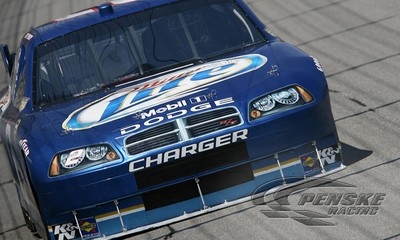Kurt Busch - NASCAR Cup Series Preview Michigan
August 13, 2008
"When was the last race there that wasn't a fuel mileage race?" Busch quizzed with a grin as if he was hiding something up his sleeve. "Yeah, that's a trick question because the answer was our big win there in this race last August. That's what made that win all the more memorable. We put a real spanking on them there that day. Fuel mileage really had nothing to do with us winning that race.
"That was definitely the exception to the rule there at Michigan," said Busch, a two-time winner on the 2.0-mile Irish Hills area track. "The strategy there has long been so similar to what's in play on the road courses where you seem to always have to have a sharp guy working the calculator in plotting the fuel mileage strategy.
"When you stop to think about it, that seems to be such a growing trend across the board these days," said Busch, the 2004 NASCAR Sprint Cup champ who has 18 career wins at stock car racing's top level entering his 16th career start at MIS. "Is that bad or good? That really depends on how you look at it. I think many spectators would much rather see the drama unfold at the end as to who could make the distance rather than see some driver fortunate enough to win by half a lap on the second-place finisher.
"By it being a growing trend, I mean just look back over the last month of racing," said Busch. "Actually, it would be good to look back over the last year of racing. I think back on Casey (Mears) winning the 600 at Charlotte (Lowe's Motor Speedway) last year. How many other races over the last year have had fuel mileage come into the equation?
"Even our win back in June at Loudon (New Hampshire International Speedway) was coming down to a fuel mileage situation," said Busch. "Because the rain came and we were leading when NASCAR called it, it didn't register with a lot of people that we'd worked our way into our fuel window to go the distance when the rain came. We had a buffer of enough cars between us and the other fast guys that we were confident we could have won even if it had gone back to green and we had finished all the laps.
"But just look back over the last month or so of racing," said Busch. "How many races came down to fuel mileage making the big difference?
"Definitely the June race at Michigan was a fuel mileage win for Dale Jr. and a lot was made of that. You had Sonoma (Infineon Raceway), our win at Loudon, Daytona, Chicago, Indy, Pocono and The Glen. Ask yourself in how many of those races did the fuel mileage game come into play."
-more-
So why is there the big trend toward almost all races becoming fuel mileage races?
"With the COT cars, everything is more even across the board," said crew chief Pat Tryson. "It's so valuable to be up front and get track position. I think we learned so much when we saw what unfolded at Chicago. We got a lap down when we got hit with a speeding penalty. Kurt was up front on the restart trying to get his lap back and just ran off and left the field up there in the clean air.
"The guy up front seems to just pull away from the field and all the cars mired back there from sixth through about 25th are so often running almost identical lap times," Tryson continued. "It's a situation of you having to play your cards the best you can. You look for whatever strategy you can play to come out ahead at the end and that so often involves the fuel mileage angle.
"You really don't run most of these races backwards strategy-wise - yes, you do that at the road courses and maybe look at that for say a Pocono race," said Tryson. "What you do is look to position yourself in the best situation possible for the end of the race. It's all about track position. Do you do four tires, two tires or no tires?
"And after the Chase guys have been determined - actually it's the case now with all the guys who know they're not going to be in the Chase - they have nothing to lose and everything to gain when it comes to gambling on fuel strategy in order to win," added Tryson. "The final 10 races will be a glorified test session for us and we'll be gambling on fuel, gambling on tires...whatever it takes to win. We've already started that and it bit us big time at Pocono (where the team ran out of fuel twice). Some times it pays off big and sometimes it doesn't.
"I'm confident that you're going so see some pretty wild things happening from here on out as far as race strategies go," concluded Tryson. "There will be some really outlandish stuff happening that'll have others asking, ‘why in heck did they do that?' Well the answer is simple. They did it because they thought they might sneak in there and win one by going the unconventional route."
So, is there an "art" to saving fuel in NASCAR Sprint Cup competition?
"I don't know if you're right in calling it an art or not, but there's definitely some techniques that a driver and team can use," Busch offered. "From a chassis standpoint, you don't want a tight race car. If you're tight, you're burning more fuel and you need to loosen it up. If it is tight, it binds up while turning through the corners and it takes more gas to propel the car forward. Of course the gearing package and jetting package with the engine all come into play.
"While I'm out there behind the wheel, I need to constantly be aware of my throttle use and the braking," Busch added. "I try to keep a smooth and disciplined rhythm going and avoid getting into any side-by-side battles and overdriving the car. You want to roll through the corners and draft the other guys when possible. At the end, desperate times may call for desperate measures. Under the yellow flag, we've been known to shut the engine off and coast when it's possible. You can work to stay down on the flat area of the track to allow the fuel pickup to keep the flow going.
"Probably the best example of all of that would be to look back at the June race and take note of what all Junior did at the end in winning that one," said Busch. "The same type of ending could likely occur there this weekend. We just hope it's us out front if it does."
This weekend's action at Michigan International Speedway gets under way with Sprint Cup practice on Friday from 12:00 noon till 1:30 p.m. Sunday's 43-car starting field will be determined in Friday's 3:40 p.m. single round of Cup qualifying. Saturday's schedule boasts Cup practice sessions from 12:30 till 1:15 p.m. and from 1:50 p.m. till 2:50 p.m. Sunday's 3M Performance 400 Sprint Cup race has a 2:00 p.m. EDT starting time, with ESPN and MRN Radio presenting live coverage of the 200-lap, 400-mile battle.
--Kurt, Pat and crew will be debuting their brand new PSC-579 Miller Lite Dodge Charger this weekend at Michigan. It is the latest of their "second-generation" COT race cars. "We ran another car there back in June, the (PSC-) 569, and think this will be a better car," said Pat. "Kurt likes that track and is a two-time winner at Michigan. We're all hoping for more success there this weekend."
--Whole lot of "Hypermiling" going on...If you are not familiar with that term, it refers to a set of techniques used to maximize fuel economy on the open road by drivers in North America these days.
According to Kurt, you may see quite a bit of NASCAR's version of "Hypermiling" going on this weekend at Michigan, a track long known for its fuel mileage races...
So, how can you "Hypermile" (save fuel) in NASCAR Sprint Cup racing?
"If I'm ever in a situation like that when my crew chief tells me we're shy on fuel and have to go into the conservation mode, there are several things that I begin do

